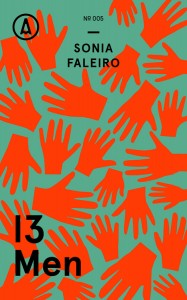 If you had to choose between advancing women’s rights and advancing the rights of a marginalized indigenous tribe, which would you choose? The tension between these two competing social justice impulses lies at the heart of the moral conflict you experience while reading Sonia Faleiro’s new 71-page ebook, 13 Men.
If you had to choose between advancing women’s rights and advancing the rights of a marginalized indigenous tribe, which would you choose? The tension between these two competing social justice impulses lies at the heart of the moral conflict you experience while reading Sonia Faleiro’s new 71-page ebook, 13 Men.
Part I of this work of narrative journalism focuses on the real-life tale of Baby, a young woman who’s a member of India’s Santhal indigenous tribe — one of the country’s hundreds of “scheduled” tribes. On Jan. 20, 2014, in the small, isolated, insular village of Subalpur in West Bengal, villagers catch Baby at home with the man she’s in love with — but he’s not just any man. He’s a diku, an outsider, someone who’s not Santhal. This is a huge no-no. He’s also Muslim, which doesn’t help the situation.
But this isn’t just a story of forbidden love and the tug of war between individual desire and doing what’s good for the community — though that timeless conflict features prominently in this ebook. This story is also about justice.
Baby and the man she considers her husband-to-be are dragged out of Baby’s home and tied to a palm tree at the home of the village’s de facto leader. The plan is that the next day, the village council — the Santhals’ own court of law — will decide on a punishment. According to Baby, that night she is untied from the tree, forced into the leader’s kitchen, and is then gang-raped by 13 men. She alleges that one of her rapists said, “We are doing this to teach you. … So that you are afraid to go to any other man.”
On Jan. 22, 2014, Baby takes a bus to a nearby police station and reports that she was gang-raped. (Baby is a pseudonym. Indian law prohibits identification of rape victims.)
At this point, you now believe that this is a case of women’s rights and prosecuting rape. The backdrop is the infamous December 2012 Delhi gang rape, which happened just 13 months earlier and exploded open a nationwide discussion about women’s status in India.
But, no, this story gets more complicated. The true victim of injustice, some argue, is not Baby, but actually the Santhal villagers.
The Santhals themselves have been on the receiving end of injustice for quite some time. The British stole their land for the purpose of cultivating cash crops. Today, with the district where Subalpur is located teeming with stone chips, quarry owners have used subterfuge, illegal land purchases, and reportedly even outright force to steal land. “When all else fails, they accuse Santhals of trumped-up crimes,” writes Faleiro.
Tribal people, even children, work 12-hour days as stone crushers on land they legally own. They’re paid less than $1 per day, receive no protective gear, and have to contend with environmental damage to their farmland and water. Basically, the Santhals have gotten screwed throughout history.
Against this history of marginalization and anti-tribal sentiment, many Santhals believe Baby was pressured and even paid off to fabricate her gang-rape story. The motive? To undermine the Santhals’ autonomy and de facto self-governance through village councils. Sometimes, these councils have succeeded in stopping businesses from seizing land. If the councils could be undermined, then it would be easier to steal land.
Nityananda Hambram, the Santhals’ supreme chief, told the media that Baby was “a pawn in a political game” and that “someone powerful convinced her to lie.”
Kunal Deb, formerly a pro-Santhal activist in the area, told Faleiro, “A police report is anything that the police want it to be … because the relationship between the police and powerful people is such a close one.” In fact, when the police brought the first five of the accused rapists to the police station, a state-level politician was already waiting there.
This tension between justice for Baby and justice for a long-marginalized indigenous tribe has vague parallels to the O.J. Simpson murder case in the United States. Nicole Brown Simpson was killed allegedly at the hands of her ex-husband, so women’s rights advocates wanted justice for the former wife of the retired football star. On the other hand, the United States has a long history of injustice toward African-Americans, particularly when a crime is perpetrated against a white woman, and Americans were sharply divided along racial lines regarding O.J.’s guilt or innocence.
When equally compelling social justice imperatives are at odds with one another, it creates a moral dilemma. And it’s this moral dilemma that leaves you thinking, debating, and wondering long after you finish clicking through this ebook.
* * *
Preeti Aroon, a writer based in Washington, D.C., is copy chief at Foreign Policy magazine and tweets at @pjaroonFP.












